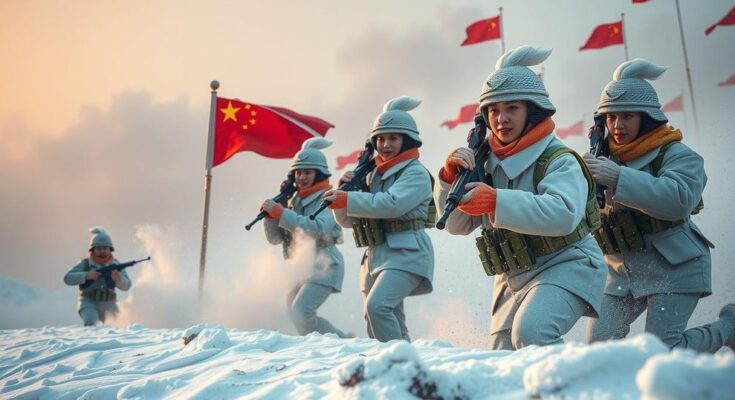In light of former President Trump’s return to the White House, China has ramped up military operations and hybrid warfare tactics, showcasing its capabilities and ambitions. Significant naval exercises, advanced military hardware introductions, and recent cyberattacks indicate a strategic push to reshape US-China relations and challenge international norms, particularly concerning Taiwan and US national security.
In recent months, China has intensified its military activities and hybrid warfare tactics, especially in anticipation of former President Donald Trump’s return to the White House. These developments are seen as both overt and covert displays of China’s growing military capabilities, positioning itself as a significant challenge to the United States and its allies. With the backdrop of the 2024 US presidential election, China’s maneuvers illustrate its aims to reshape the international order and deter support for Taiwan.
The Chinese military’s recent actions include the deployment of approximately 90 naval and coast guard vessels around Taiwan and southern Japanese islands, marking the largest military exercise since the 1996 Taiwan Strait Crisis. Moreover, there were over 60 incursions into Taiwan’s air defense identification zone, simulating attacks on foreign ships, showcasing military dominance with impunity. The synchronization of these activities coincides with significant political events, such as Taiwanese President Lai Ching-te’s diplomatic visits, reflecting a pronounced strategic approach.
Moreover, China has unveiled advanced military hardware, including new aircraft and enhanced naval vessels, indicating a commitment to bolster its defense capabilities significantly. Notably, the introduction of the J-35A stealth fighter and the CNS Sichuan, a significant upgrade in naval warfare, underscores Beijing’s ambition to challenge US military leadership in the region. Additionally, accusations of China’s involvement in cyberattacks targeting US governmental bodies, alongside its maneuvers in sensitive maritime zones, expose vulnerabilities within American national security.
The response from China is calibrated to gauge and influence the incoming administration’s policy decisions, projecting power at a time of potential political transition in the US. As emphasized by experts, such actions may be indicative of a long-term strategy to intimidate external support for Taiwan and assess the characteristics of the anticipated Trump administration’s foreign policy. The culmination of these initiatives not only illustrates China’s strategy but also underscores the intricate geopolitical landscape that the next US administration will navigate.
The backdrop for these recent military escalations is the considerable tension between China and the United States, particularly regarding Taiwan’s status and the broader security dynamics in the Asia-Pacific region. As the Pentagon has labeled China as a primary strategic challenge, Beijing has identified opportunities to assert its influence and demonstrate military power, particularly in light of the forthcoming US presidential transition. The current geopolitical climate is fraught with complexity, involving not only US-China relations but also the interactions and alliances among nations within the region. Recent incidents of cyberattacks and hostile military drills reveal a concerted effort by China to position itself favorably against perceived threats while capitalizing on political vulnerabilities in the US administration that may arise.
China’s recent military activities and displays of power reflect its strategic intentions and the challenges it poses to the United States. With heightened tensions surrounding Taiwan and an aggressive posture in cyberspace, the incoming administration must address these emerging threats decisively. The implications of China’s actions extend beyond bilateral relations, impacting alliances and security frameworks across the Asia-Pacific region. As geopolitical dynamics continue to evolve, the significance of China’s maneuvers will remain a critical focus point for US foreign policy.
Original Source: www.businessinsider.com




